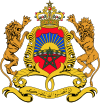
Treaty of Fes
| Treaty Concluded Between France and Morocco on 30 March 1912, for the Organization of the French Protectorate in the Sharifian Empire Traité conclu entre la France et le Maroc le 30 mars 1912, pour l'organisation du protectorat français dans l'Empire chérifien | |
|---|---|
 | |
| Signed | March 30, 1912 |
| Location | Fes |
| Signatories | |
| History of Morocco |
|---|
 |
The Treaty of Fes (Arabic: معاهدة فاس, French: Traité de Fès), officially the Treaty Concluded Between France and Morocco on 30 March 1912, for the Organization of the French Protectorate in the Sharifian Empire (French: Traité conclu entre la France et le Maroc le 30 mars 1912, pour l'organisation du protectorat français dans l'Empire chérifien),[2] was a treaty signed by Sultan Abd al-Hafid of Morocco under duress and French diplomat Eugène Regnault on 30 March 1912. It established the French protectorate in Morocco, and remained in effect until the Franco-Moroccan Joint Declaration of 2 March 1956.[2][3]

The treaty gave France the right to occupy certain parts of the country with the pretext of protecting the Sultan from internal opposition, and to hold actual reins of power while preserving the mask of indirect rule consisted of the Sultan and the Sharifian government. Under the terms, the French Resident-General held absolute powers in external as well as internal affairs, and was the only one capable of representing Morocco in foreign countries. The Sultan however, retained the right to sign the decrees (dahirs), which were submitted by the Resident-Generals.[4]

When news of the treaty finally leaked to the Moroccan populace, it was met with immediate and violent backlash in the Intifada of Fes.[5]

Background
Context
Weakened by defeat in the Franco-Moroccan War, Morocco signed the Anglo-Moroccan Treaty of 1856, which broke the Moroccan state's monopoly on customs revenue, a vital source of income for the Makhzen.[6]: 23 The Treaty of Wad Ras following the Hispano-Moroccan War (1859–60) forced Morocco to take a massive British loan—larger than its national reserves—in order to pay off a massive war indemnity to Spain, putting the Makhzen further in debt.[6]: 25

European presence in Morocco—in the form of advisors, doctors, businessmen, adventurers, and even missionaries—dramatically increased after the Madrid Conference of 1880, which was held at the behest of Sultan Hassan I in response to France and Spain's abuse of the protégé system.[6]: 46–47 More than half of the Makhzen's expenditures went abroad to pay war indemnities and buy weapons, military equipment, and manufactured goods.[6]: 60


From 1902 to 1909, Morocco's trade deficit increased 14 million francs annually, and the Moroccan rial depreciated 25% from 1896 to 1906.[6][page needed] Morocco became bridled under loans and debts to balance its budget.[6][page needed] The first of these came in December 1901–7.5 million francs borrowed from French banks 6% interest.[6][page needed] This was followed by British and Belgian loans.[6][page needed] Abdelaziz tried to impose a tartib (ترتيب)—a flat tax universally hated that failed by 1903.[6][page needed] In June 1904, France bailed out the Makhzen with 62.5 million franks, guaranteed by a portion of customs revenue.[6][page needed]

The Moroccan historian Abdallah Laroui noted: "The more those at the top borrowed, the more those at the bottom were impoverished."[7] Morocco experienced a famine from 1903 to 1907, as well as insurrections led by El-Rogui (Bou Hmara) and Mulai Ahmed er Raisuni.[6][page needed] Abd al-Hafid wrested the throne from his brother Abd al-Aziz in the Hafidiya (1907–1908) coup d'état.[6]: 76–78

French concessions to competing powers
Private agreements among the United Kingdom, Italy and France in 1904, collectively known as the Entente Cordiale, made without consulting the sultan, had divided the Maghreb into spheres of influence, with France given Morocco. The 1906 Treaty of Algeciras formalized the French pre-eminence over other European great powers in Morocco,[6]: 88 and affirmed its right to collect customs revenue from Moroccan ports.[6]: 73

In the aftermath of the Agadir Crisis of 1911, Germany recognised the French position in Morocco[6][page needed] and received in return territories in the French Equatorial Africa the colony of Middle Congo (now the Republic of the Congo). The land, known as Neukamerun, became part of the German colony of Kamerun, part of German West Africa, although it lasted only briefly because it was captured by the Allies during World War I. As part of the treaty, Germany ceded France a small area of territory to the south-east of Fort Lamy, now part of Chad.

Makhzen view
In Morocco, the young Sultan Abdelaziz acceded in 1894 at the age of 16, Europeans became the main advisers at the court and local rulers became more and more independent from the sultan. Sultan Abdelaziz was deposed in 1908. Moroccan law and order continued to deteriorate under his successor, Abdelhafid, who abdicated in favor of his brother Yusef after signing the Treaty of Fez.

Makhzen officials believed the protectorate system in Morocco would resemble British Egypt, with substantial autonomy in domains such as internal administration and justice.[8]: 181 However, the Treaty of Fes was modelled after the Treaty of Bardo of 12 May 1881, which made Tunisia a French protectorate and severely limited the Bey's authority.[8]: 181

An interim government, led by Abdelhafid's brother, Ziin al-'Aabidiin, who was promoted sultan in Meknes on 17 April 1911, also put pressure on Abdelhafid.[9][10]

Eugène Regnault, ministre plénipotentiaire of France in Tangier, arrived in Fes on 24 March after long meetings in Paris with the Treaty of Fes in his possession.[8]: 180–181

In March 1912, negotiations at the Royal Palace in Fes between Sultan Abd al-Hafid of Morocco and Eugène Regnault[2] were interpreted by Abdelqader Benghabrit, who was then working as the translator at the French Legation in Tangier.[11] The negotiations on 29 March, held with the French military surrounding the city,[2] lasted for 6 hours from 6:00 pm until midnight.[2] They culminated in the signing of the Treaty of Fes, which established the French Protectorate in Morocco on 30 March.[2]

-
Eugène Regnault, "the fortunate negotiator," on the front page of Le Matin the day after the signature of the Treaty of Fes.
-
An illustration of Abd al-Hafid signing the Treaty of Fes on the front page of Le Petit Journal's weekly Supplément illustré, printed August 25, 1912.
Effects
France gained authority over non-Moroccan citizens in legislative, military, foreign policy and jurisdictional transactions, though nominally leaving the Moroccan government in control of its own citizens. Moroccan nationalists dispute this, noting that France still influenced Moroccan affairs as a result of the treaty.[12]

The Treaty Between France and Spain Regarding Morocco, concluded on 27 November 1912, established the Spanish protectorate in Morocco.[6][page needed] By this agreement, Spain gained a zone of influence in the Rif and the Cape Juby areas, where the Sultan remained nominally the sovereign and was represented by a vice regent under the control of the Spanish high commission.[13] The treaty also granted the concession for exploitation of the iron mines of Mount Uixan to the Spanish Rif Mines Company, which was also given permission to build a railroad to connect the mines with Melilla.

Moroccan reception
1912 Fes riots

The treaty was kept secret until, on 17 April, the population of Fes learned of it and riots broke out.[5] Abdelhafid had already left Fes seeking safety in Rabat, but the Mellah, or Jewish quarter, of Fes was bombarded by French artillery and then sacked by tribesmen in Fes for the weekly market.[5] After the violence, Resident General Hubert Lyautey decided to make Rabat the capital instead of Fes.[5]

Moroccan resistance
Moroccan resistance to French colonialism continued after the Treaty of Fes, with the Zaian War and the Rif War, for example.[6][page needed]

Text
| French | Arabic | English translation |
|---|---|---|
| Le Gouvernement de la République française et le Gouvernement de Sa Majesté Chérifienne, soucieux d'établir au Maroc un régime régulier, fondé sur l'ordre intérieur et la sécurité générale, qui permettra l'introduction des réformes et assurera le développement économique du pays, sont convenus des dispositions suivantes. | The Government of the French Republic and the Government of His Sharifian Majesty, desirous of inaugurating a regular regime in Morocco based upon internal order and general security, making it possible to introduce reforms and to insure the economic development of the country, have agreed upon the following:[14] | |
| Article I. | الفصل الأول | Article I |
Le Gouvernement de la République française et Sa Majesté le sultan sont d'accord pour instituer au Maroc un nouveau régime comportant les réformes administratives, judiciaires, scolaires, économiques, financières et militaires que le Gouvernement français jugera utile d'introduire sur le territoire marocain. 
Ce régime sauvegardera la situation religieuse, le respect et le prestige traditionnel du Sultan, l'exercice de la religion musulmane et des institutions religieuses, notamment de celles des habous. Il comportera l'organisation d'un Maghzen chérifien réformé. 
Le Gouvernement de la République se concertera avec le Gouvernement espagnol au sujet des intérêts que ce gouvernement tient de sa position géographique et de ses possessions territoriales sur la côte marocaine. 
De même, la ville de Tanger gardera le caractère spécial qui lui a été reconnu et qui déterminera son organisation municipale.  |
إن دولة الجمهورية الفرنسوية وجلالة السلطان قد اتفقا على تأسيس نظام جديد بالمغرب مشتمل على الإصلاحات الإدارية والعدلية والتعليمية والاقتصادية والمالية والعسكرية التي ترى الدولة الفرنسية إدخالها نافعا بالإيالة المغربية  وهذا النظام يكون يحترم حرمة جلالة السلطان وشرفه العارم وكذلك الحالة الدينية وتأسيساتها والشعائر الإسلامية وخصوصا تأسيسات الأحباس كما يكون هذا النظام محتويا على تنظيم مخزن شريف مضبوط.  دولة الجمهورية تتفاوض مع الدولة الاصبنيولية في شأن المصالح الناشئة لهذه الدولة من حالتها الجغرافية ومستعمراتها الأرضية الكائنة بالساحل المغربي  كما أن مدينة طنجة تبقى على حالتها الخصوصية المعترف لها بها والتي من مقتضاها يتأسس نظامها البلدي  |
The Government of the French Republic and His Majesty the Sultan have agreed to establish in Morocco a new regime admitting of the administrative, juridical, educational, economic, financial and military reforms which the French Government may deem useful to be introduced within the Moroccan territory.
This regime shall safeguard the religious status, the respect and traditional prestige of the Sultan, the exercise of the Mohammedan religion and of the religious institutions and in particular those of the habous. It shall admit of the organization of a reformed Sharifian makhzen. The Government of the Republic will come to an understanding with the Spanish Government regarding the interests which this government has in virtue of its geographical position and territorial possessions on the Moroccan coast. In like manner, the City of Tangiers shall retain the distinctive characteristic for which it has been known and which will determine its municipal organization.[14] |
| Article II. | الفصل الثاني | Article II |
| S. M. le sultan admet dès maintenant que le Gouvernement français procède, après avoir prévenu le Maghzen, aux occupations militaires du territoire marocain qu'il jugerait nécessaires au maintien de l'ordre et de la sécurité des transactions commerciales et à ce qu'il exerce toute action de police sur terre et dans les eaux marocaines. | جلالة السلطان يساعد من الآن على الاحتلالات العسكرية بالإيالة المغربية التي تراها الدولة واجبة لاستثبات السكينة والتأمين على المعاملات التجارية وذلك بعد تقديم الإعلام للمخزن الشريف كما يساعد على أن الدولة الفرنسوية تقوم بعمل الحراسة برا وكذلك بحرا بالمياه المغربية | His Majesty the Sultan consents that henceforth the French Government, after it shall have notified the makhzen, may proceed to such military occupation of the Moroccan territory as it might deem necessary for the maintenance of good order and the security of commercial transactions, and to exercise every police supervision on land and within the Moroccan waters.[14] |
| Article III. | الفصل الثالث | Article III |
| Le Gouvernement de la République prend l'engagement de prêter un constant appui à Sa Majesté Chérifienne contre tout danger qui menacerait sa personne ou sou trône ou qui compromettrait la tranquillité de ses États. Le même appui sera prêté à l'héritier du trône et à ses successeurs. | دولة الجمهورية تتعهد بإعطائها لجلالة السلطان الإعانة المستمرة ضد كل خطر يمس بذاته الشريفة أو بكرسي مملكته أو ينشأ عنه اضطراب بإيالته وهذا الإعانة تعطى أيضا لوالي العهد أو لمن يخلفه | The Government of the Republic pledges itself to lend constant support to His Sharifian Majesty against all dangers which might threaten his person or throne, or endanger the tranquillity of his states. The same support shall be given the heir to the throne and his successors.[14] |
| Article IV. | الفصل الرابع | Article IV |
| Les mesures que nécessitera le nouveau régime de protectorat seront édictées, sur la proposition du Gouvernement français, par Sa Majesté Chérifienne ou par les autorités auxquelles elle en aura délégué le pouvoir. Il en sera de même des règlements nouveaux et des modifications aux règlements existants. | إن الوسائل التي يتوقف عليها نظام الحماية الجديد تبرز على يد جلالة السلطان وعلى يد الولاة الذين لهم التفويض من الجناب الشريف وذلك بمعروض من الدولة الفرنسوية وهذا العمل يكون جاريا أيضا في الضوابط الجديدة والتغييرات في الضوابط الموجودة | Such measures as the new regime of the protectorate may require shall be edicted, upon the proposal of the French Government, by His Sharifian Majesty or the authorities to whom he may have delegated his power. The same process shall be observed in the matter of new regulations and of modifications to the existing regulations.[14] |
| Article V. | الفصل الخامس | Article V |
| Le Gouvernement français sera représenté auprès de Sa Majesté Chérifienne par un Commissaire résident général, dépositaire de tous les pouvoirs de la République au Maroc, qui veillera à l'exécution du présent accord. Le Commissaire résident général sera le seul intermédiaire du Sultan auprès des représentants étrangers et dans les rapports que ces représentants entretiennent avec le Gouvernement marocain. Il sera, notamment, chargé de toutes les questions intéressant les étrangers dans l'empire chérifien. Il aura le pouvoir d'approuver et de promulguer, au nom du Gouvernement français, tous les décrets rendus par Sa Majesté Chérifienne. |
تعيّن الدولة الفرنساوية مندوبا مقيما عاما يكون نائبا عنها لدى جلالة السلطان ومستودعا لتفويضاتها بالمغرب كما يكون يسهر على القيام بإنجاز هذا الوفق.  يكون المندوب المقيم العام هو الواسطة الوحيد بين جلالة السلطان ونواب الأجانب كما يكون الواسطة أيضا في المصارفة التي لهؤلاء النواب مع الدولة المغربية المندوب المقيم العام يكون مكلفا بسائر المسائل المتعلقة بالأجانب في الإيالة الشريفة  ويكون له التفويض بالمصادقة والإبراز في اسم الدولة الفرنسوية لجميع القوانين الصادرة من جلالة السلطان الفصل السادس نواب فرنسة السياسيون والقنصليون يكونون هم النائبون عن المخزن والمكلفون بحماية رعايا ومصالح المغرب بالأقطار الأجنبية جلالة السلطان يتعهد بعدم عقد أي وفق كان له معنا دولية من غير موافقة دولة الجمهورية الفرنساوية  |
The French Government shall be represented near His Sharifian Majesty by a resident commissioner general, representative of all the powers of the republic in Morocco, who shall attend to the execution of the present agreement.
The resident commissioner general shall be the sole intermediary of the Sultan near foreign representatives and in the relations which these representatives maintain with the Moroccan Government. In particular, he shall have charge of all matters relating to foreigners in the Sharifian Empire. He shall have the power to approve and promulgate, in the name of the French Government, all the decrees issued by His Sharifian Majesty.[14] |
| Article VI. | الفصل السادس | Article VI |
| Les agents diplomatiques et consulaires de la France seront chargés de la représentation et de la protection des sujets et des intérêts marocains à l'étranger. Sa Majesté le Sultan s'engage à ne conclure aucun acte ayant un caractère international sans l'assentiment préalable du Gouvernement de la République française. |
The diplomatic and consular agents of France shall be charged with the representation and protection of Moroccan subjects and interests abroad.
His Majesty the Sultan pledges himself not to conclude any act of an international nature without the previous approval of the French Republic.[14] | |
| Article VII. | الفصل السابع | Article VII |
| Le Gouvernement de la République française et le Gouvernement de Sa Majesté Chérifienne se réservent de fixer d'un commun accord les bases d'une réorganisation financière qui, en respectant les droits conférés aux porteurs des titres des emprunts publics marocains, permette de garantir les engagements du trésor chérifien et de percevoir régulièrement les revenus de l'Empire. | دولة فرنسة والدولة الشريفة يتأملا فيما بعد باتفاق معا في تأسيس أصول شاملة لنصب نظام مالي يسوغ به ضمانة ما يتعهد به بيت المال الشريف وقبض محصولات الإيالة على وجه منظم وذلك مع احترام الحقوق المخولة لحملة سهام السلفات المغربية العمومية | The Government of the French Republic and the Government of His Sharifian Majesty reserve unto themselves to determine by mutual agreement the bases for a financial reorganization which, while respecting the rights conferred upon bondholders of the Moroccan public loans, shall make it possible to guarantee the engagements of the Sharifian treasury and to collect regularly the revenues of the empire.[14] |
| Article VIII. | الفصل الثامن | Article VIII |
| Sa Majesté Chérifienne s'interdit de contracter à l'avenir, directement ou indirectement, aucun emprunt public ou privé et d'accorder, sous une forme quelconque, aucune concession sans l'autorisation du Gouvernement français. | يتعهد جلالة السلطان بأن لا يعقد في المستقبل أما رأسا أما بواسطة أي سلف كان عموميا أو خصوصيا أو يمنح بأي صفة كانت باختصاص من الاختصاصات من غير موافقة الدولة الفرنسوية | His Sharifian Majesty declares that in future, he will refrain from contracting, directly or indirectly, any public or private loan, and from granting in any form whatever any concession without the authorization of the French Government.[14] |
| Article IX. | الفصل التاسع | Article IX |
| La présente convention sera soumise à la ratification du Gouvernement de la République française et l'instrument de ladite ratification sera remis à S. M. le sultan dans le plus bref délai possible. | هذا الوفق يقدم لمصادقة دولة الجمهورية الفرنسوية ونص المصادقة يرفع لجلالة السلطان في أقرب وقت ممكن | This agreement is to be delivered to the government of the Republic of France for ratification, and the ratified text is to be returned to His Majesty the sultan as soon as possible. |
وبمقتضى ما سطر أعلاه حرر الفريقان هذا الوفق وختما عليه بختمهما بعاصمة فاس يوم الثلاثين مارس سنة 1912 الموافق حادي عشر ربيع الثاني عام 1330 عبد الحفيظ له الله  Pour traduction et certification : certifiées conformes يشهد الواضعان خط يدهما أسفله صحة التعريب أعلاه و مطابقته للنص الفرنساوي حرفاحرفا كما يشهدان بإصلاح التاريخ  |
See also
- French Morocco
- History of Morocco
- Mnebhi Palace—location of the Treaty's signing
- Moroccan Debt Administration
- Spanish Morocco
References
- ^ "Pièce n° TRA19120019/001". France Diplomatie: Ministère de l'Europe et des Affaires étrangères.
- ^ a b c d e f "Traité conclu entre la France et la Maroc le 30 Mars 1912, pour l'Organisation du Protectorat Français dans l'Empire Chérifien" (PDF). Empire Chérifien Protectorat de la République Français au Maroc Bulletin Officiel Édition Française. No. 1. 1 November 1912. Archived from the original (PDF) on 2015-09-24. Retrieved 30 March 2022.
- ^ "Indépendance du Maroc, 1956, MJP". mjp.univ-perp.fr. Retrieved 2020-03-03.
- ^ Ikeda, Ryo (2015). The Imperialism of French Decolonisaton: French Policy and the Anglo-American Response in Tunisia and Morocco. Palgrave Macmillan. pp. 14–15. ISBN 978-1-137-36895-9. OCLC 914166414.
- ^ a b c d Kenbib, Mohammed (2014). "Fez Riots (1912)". In Norman A. Stillman (ed.). Encyclopedia of Jews in the Islamic World. Brill Online. doi:10.1163/1878-9781_ejiw_sim_0007730. ISSN 1878-9781. Retrieved 2021-10-28.
- ^ a b c d e f g h i j k l m n o p q r Miller, Susan Gilson (2013). A History of Modern Morocco. New York: Cambridge University Press. ISBN 978-1-139-62469-5. OCLC 855022840.
- ^ Laroui, Abdallah (1977). Les origines sociales et culturelles du nationalisme marocain : 1830–1912 / Abdallah Laroui. p. 340.
- ^ a b c Burke, Edmund III (2009). Prelude to Protectorate in Morocco: Pre-Colonial Protest and Resistance, 1860–1912. Chicago: University of Chicago Press. p. 181. ISBN 978-0-226-08084-0.
- ^ "ذكرى استقلال المغرب.. شعبٌ يحرّر عرشه". الجزيرة الوثائقية (in Arabic). 2019-11-18. Retrieved 2020-05-09.
- ^ "هل باع السلطان مولاي حفيظ المغرب بـ500 ألف فرنك؟". chaabpress.com. Retrieved 2020-05-09.
- ^ "قدور بن غبريط.. جزائري في المخزن المغربي". التاريخ المغاربي (in Arabic). 2020-02-21. Retrieved 2020-03-15.
- ^ Mitchell, Harriett (1955). "The Development of Nationalism in French Morocco". Phylon. 16 (4): 428. doi:10.2307/272660. JSTOR 272660.
- ^ Nelson, Harold D., ed. (1985). Morocco: A Country Study (PDF). Foreign Area Studies. Washington, D.C.: The American University; Government Printing Office. p. 43. DA Pamphlet No.550-49.
- ^ a b c d e f g h i "Protectorate Treaty Between France and Morocco". The American Journal of International Law. 6 (3 Supplement: Official Documents): 207–209. July 1912. doi:10.2307/2212598. JSTOR 2212598. S2CID 246011772.
External links
 Media related to Treaty of Fes at Wikimedia Commons
Media related to Treaty of Fes at Wikimedia Commons
See what we do next...
OR
By submitting your email or phone number, you're giving mschf permission to send you email and/or recurring marketing texts. Data rates may apply. Text stop to cancel, help for help.
Success: You're subscribed now !











